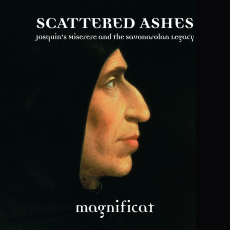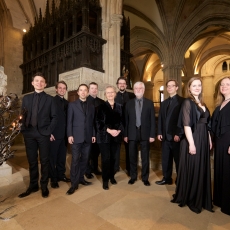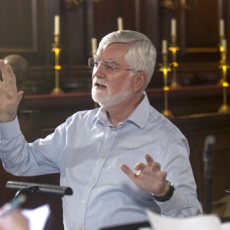Magnificat - Scattered Ashes - Andrew Benson Wilson.org
Magnificat vocal ensemble celebrate their 25th anniversary with this CD of extraordinarily powerful large-scale polyphonic works by Renaissance masters, all influenced by the equally extraordinary Italian Dominican friar and prophet, Girolamo Savonarola. His rather alarming prophesies (including declaring Florence to be the ‘New Jerusalem', the destruction of all things secular, and a biblical flood), his denouncement of the Medicis, clerical corruption, and the exploitation of the poor, together with his extreme puritanical views (resulting in the Bonfire of the Vanities) led, not surprisingly, to his getting himself caught up in Italian and Papal politics.
The Duke of Ferrara, of the Ferrara d'Este family, was a supporter of Savonarola. After his execution, the Duke asked his newly appointed composer, Josquin des Prez, to write a setting of Savonarola's meditation Infelix ego, written after torture and awaiting execution using the right hand that the torturers had spared so that he could write his confession. The result was Josquin's monumental Miserere mei, Deus, lasting nearly 18 minutes, and built around the repeated refrain of Miserere mei, Deus, sung by a tenor at different pitches after each of the 19 verses (and possibly intended for the 80 year old Duke himself to sing). One of Savonarola's criticisms of music was that the text was often unintelligible, and the clarity of texture and syllabic text setting in Josquin's setting reflects that view. In their performance, Magnificat use single voices for several passages before bringing in their full compliment of 16 singers for the five-part passages. They clearly delineate the three sections of the motet (and with similar breaks in other pieces) albeit, in this case, with the tiniest of tiny pitch drops at the start of the second section - I had to use a meter to check that my ears were not deceiving me.
As Josquin had been clearly inspired by Savonarola's text, so many other composers were, in turn, influenced by Josquin's setting. The rest of the recording reflects that influence, with composers reflecting on the Psalm texts upon which Savonarola had based his Infelix ego, together with references to Josquin compositional techniques. All have a similar steady underlying pulse, helping to unify the eight pieces. I also rather admire the fact that, rather than omit a piece, Linn records have released this on two CDs, with a total of 84 minutes, only just over the limit for a single CD. With music as intense and spiritual as this, having to change CDs half way through the programme is a help.
Le Jeune's Tristitia obsedit me has military hints, while Lassus's Infelix ego unfolds gently, albeit with some lovely harmonic twists and turns. The final piece, and the latest in composition, is William Byrd's 13 minute long and immensely expressive Infelix ego. Byrd may well have known some of the earlier settings of the text, as some are known to have been owned by one of his patrons. Although he might not have approved of some of Savonarola's pre-Lutheran views, he certainly got to the heart of his intense emotion of his words.
Director Philip Cave has assembled some of the finest voices around, topped by two sopranos that I have frequently praised. As expected from Linn and Philip Hobbs, the recording quality is outstanding. This is a glorious way to celebrate 25 years of fine music making.


